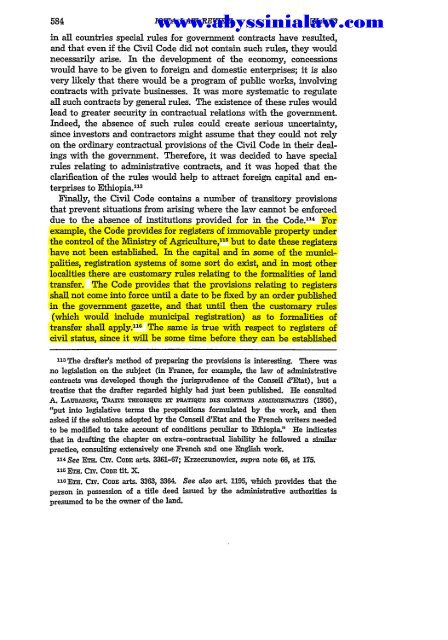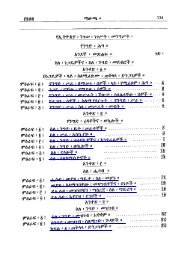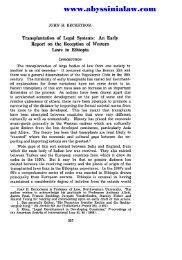Create successful ePaper yourself
Turn your PDF publications into a flip-book with our unique Google optimized e-Paper software.
IOWA LAW REVIEW<br />
in all countries special rules for government contracts have resulted,<br />
and that even if the Civil Code did not contain such rules, they would<br />
necessarily arise. In the development of the economy, concessions<br />
would have to be given to foreign and domestic enterprises; it is also<br />
very likely that there would be a program of public works, involving<br />
contracts with private businesses. It was more systematic to regulate<br />
all such contracts by general rules. The existence of these rules would<br />
lead to greater security in contractual relations with the government.<br />
Indeed, the absence of such rules could create serious uncertainty,<br />
since investors and contractors might assume that they could not rely<br />
on the ordinary contractual provisions of the Civil Code in their dealings<br />
with the government. Therefore, it was decided to have special<br />
rules relating to administrative contracts, and it was hoped that the<br />
clarification of the rules would help to attract foreign capital and enterprises<br />
to Ethiopia.22 3<br />
Finally, the Civil Code contains a number of transitory provisions<br />
that prevent situations from arising where the law cannot be enforced<br />
due to the absence of institutions provided for in the Code. 1 4 For<br />
example, the Code provides for registers of immovable property under<br />
the control of the Ministry of Agriculture, 1 5 but to date these registers<br />
have not been established. In the capital and in some of the municipalities,<br />
registration systems of some sort do exist, and in most other<br />
localities there are customary rules relating to the formalities of land<br />
transfer. The Code provides that the provisions relating to registers<br />
shall not come into force until a date to be fixed by an order published<br />
in the government gazette, and that until then the customary rules<br />
(which would include municipal registration) as to formalities of<br />
transfer shall apply. 6 [VOL 53<br />
www.abyssinialaw.com<br />
The same is true with respect to registers of<br />
civil status, since it will be some time before they can be established<br />
13 The drafter's method of preparing the provisions is interesting. There was<br />
no legislation on the subject (in France, for example, the law of administrative<br />
contracts was developed though the jurisprudence of the Conseil d'Etat), but a<br />
treatise that the drafter regarded highly had just been published. He consulted<br />
A. LAIADER, TRT THEORIQUE E PRATIQUE DES CONTRATS ADLvMSATIFS (1956),<br />
"put into legislative terms the propositions formulated by the work, and then<br />
asked if the solutions adopted by the Conseil d'Etat and the French writers needed<br />
to be modified to take account of conditions peculiar to Ethiopia." He indicates<br />
that in drafting the chapter on extra-contractual liability he followed a similar<br />
practice, consulting extensively one French and one English work.<br />
"1 'See ETIH CiV. CODE arts. 3361-67; Krzeczunovicz, supra note 66, at 175.<br />
"t E m. Civ. CODE tit. X.<br />
110 ET. CiV. CODE arts. 3363, 3364. See also art. 1195, which provides that the<br />
person in possession of a title deed issued by the administrative authorities is<br />
presumed to be the owner of the land.





